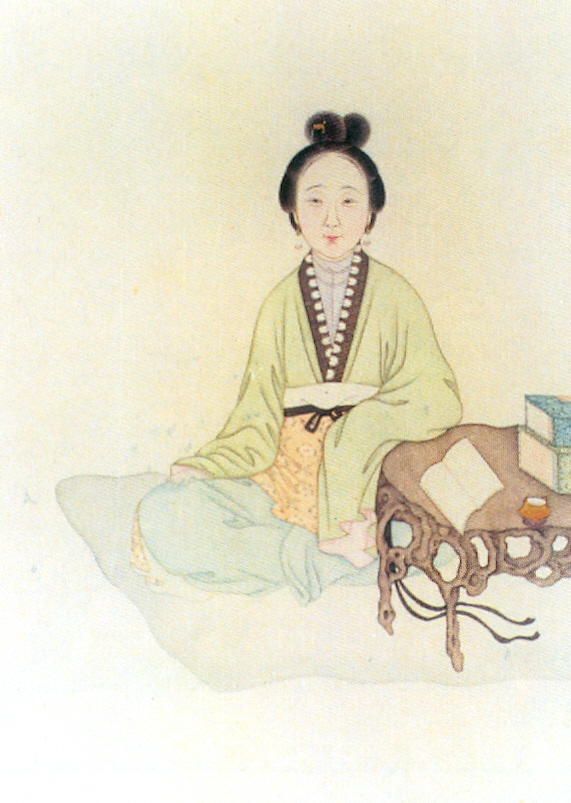 |
| This courtesan's home is now a museum! Hooray! |
8. Bian Yujing
A courtesan and painter, she had a number of famous clients (it feels weird to call these transactional relationships "romances"), including with Qian Qianyi (poet, scholar, social historian), Wu Sangui (military general instrumental in the fall of the Ming Dynasty), and Wu Weiye (a poet who was so obsessed with her that he wrote a bunch of poems about her). In the end, she did a 180 with her life and became a Daoist Priestess.
7. Ma Xianglan
Beginning her time as a courtesan at age 15 (yikes), she would go on to become the matriarch at a courtesan society which encouraged all of its hos to be educated in the arts. She was a high-class Elliot Spitzer type of madame who only catered to elite customers. She carried on a famous romance and exchanged love letters with Wang Zhideng, a famous calligrapher known for graceful strokes. Ma also was a somewhat notable painter, generating landscapes, orchids, and bamboo imagery combined with calligraphy. I guess that's cool.
6. Dong Xiaowan
 |
| The Christian Dior of 17th Century China. |
5. Kou Baimen
A "registered" teenage prostitute (hey, it's good to have your certificates in order), she had a good run at the ho thing until she was late in her teenage years and caught the attention of a high official named Zhu Guobi. He married her in a lavish ceremony but the honeymoon didn't last and they became estranged. When the Qing revolution came around in 1644, Zhu was arrested and jailed. Kou Baimen scrounged up enough money to buy her husband's freedom, but the payment was sort of a two-for-one deal, as she also bought her own freedom from him. What did she do after that? Well, she turned back into a courtesan again, and would go on to have numerous relationships with nobles and writers, including poet Fang Wen who wrote a bunch of poems about her because he's super clingy and was reading a way lot more into the courtesan thing than he should have.
4. Li Xiangjun
 |
| Oh, you flirt you. |
3. Gu Hengbo
Famous as a painter of orchids, she was the hostess of a "literary saloon" called Meilou (apparently meaning "House of Bewitchment"). She'd have a number of famous and notable clients, but also considered jumping out of the courtesan game and finding herself a steady man. She initially wanted to go with one of her patrons, Liu Fang. But then she changed her mind and decided she didn't want to marry him and that she'd go back to being a ho and sleeping with clients. This didn't sit well with Liu Fang, who reacted in a very moderate way by killing himself. Eventually Gu would settle down with Gong Dingzi, a renowned author and poet. After that, she basically ran his life and controlled him - which is a hell of a good outcome, all things considered.
2. Liu Rushi
Her family sold her as a concubine at a young age, which is a pretty horrible thing to say. However, they did sell her to the,/ Prime Minister of the Ming Dynasty at the time, Zhou Daodeng. So at least they sold her to someone super famous, huh? It's not like they sold her to Larry on the street corner. Still horrible. At age 13 when she had already been a concubine for some time (yikes, these stories don't get any easier from here, folks) she caused a "scandal" and was sold again, this time to a brothel. She'd go on to have a number of relations with famous Chinese nobles and artists, but she bagged the big one when she got Qian Qianyi (as previously mentioned with Bian Yujing). She apparently pulled a full Mulan on him by pretending to be a man when meeting him, getting into an argument, and then only later have the gender reveal. Qian Qianyi married her, in fact, and treated her as his principle wife (technically she wasn't, and was only a concubine wife). When the Ming Dynasty came to an end in 1644, Liu tried to get her husband to kill himself because she was obviously tired of his shit. He didn't though, and he tried to lead a resistance movement against the new Qing regime. He never regained his social status though, and later died heavily in debt. Liu was harassed by debt collectors (some things never change) and just decided to hang herself. The end!
1. Chen Yuanyuan
 |
| She looks like a grandma here, but okay. |
No comments:
Post a Comment